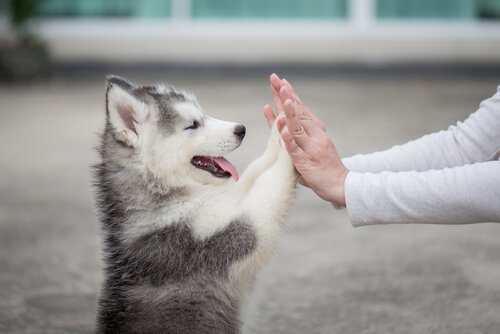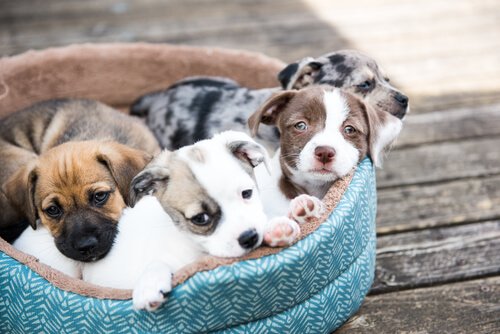Puppy's Hiccups: How to Treat Them


Written and verified by the lawyer Francisco María García
It’s completely normal for a puppy to get hiccups. This involuntary contraction of their diaphragm could be caused by them eating too much or moving around constantly. Although hiccups are annoying, they usually go away after a few minutes. However, they could last for a while, even an entire day. Below you can find out how to treat your puppy’s hiccups.
In order to solve this problem, you should first analyze what kind of hiccups they are having and what’s causing them. Hiccups in puppies can have different causes. It might even be two or more things that are causing them, which makes your puppy more sensitive and prone to getting hiccups:
- The cold: especially in small breeds like poodles or chihuahuas.
- Eating or drinking too quickly
- Stressful situations, fear or fatigue
- Rejecting certain foods

How to keep your dog from getting hiccups
One of the most common causes of hiccups is the cold. Puppies need blankets that keep them warm from the cold ground. You should especially make sure that their chest and abdomen are protected from the cold.
Some small dogs need to be protected at all times from the wind and cold weather. Putting clothes on your puppy will also help them maintain their body heat.
The second reason puppies may get hiccups is that they’re eating too fast. There are ways to keep your dogs from eating in that manner and there is no need take them to a doggy daycare because they can learn to be patient and to eat their food slowly right at home.
The typical way to teach a puppy is to ration their food into six portions and wait thirty seconds between each portion of food.
Stressful situations can also cause hiccups in puppies. When a puppy has hiccups, you have to evaluate all of the possibilities. If they weren’t caused by the food or the cold weather, you should assume that they were frightened by something or they have chronic stress.
In the latter case, if the hiccups are left untreated, they could cause other diseases in your pet. If you can’t figure out what is causing their stress, you should consult with a specialist in canine psychology.

Poor digestion or eating foods that your puppy is intolerant to can also cause hiccups. This can be determined by looking at what your puppy ate the day before.
Sometimes, young dogs eat everything that’s in front of them. A toxic plant, a piece of plastic, or anything that isn’t normally in their diet can cause stomach problems, hiccups, among other things.
What can I do to treat my puppy’s hiccups?
Hiccups actually is a natural response in dogs. It’s a sporadic diaphragmatic contraction that helps the stomach eliminate gases. It’s also a kind of “massage” for any possible discomfort in the esophagus.
Hiccups also balance the nerve coordination that articulate diaphragmatic functions. They’re sometimes confused with respiratory problems that sound similar. If your dog gets them often, you should take them to the vet.
Puppies can get scared if they have hiccups, but that doesn’t mean that they’re in pain or have any discomfort. The best thing to do is to help them calm down. Don’t try to cure their hiccups by scaring him.
Scaring them will only make their nervousness and anxiety worse. You have to be patient. As he gets older, his hiccup episodes will lessen.
In summary:
- Hiccups in puppies only last a few minutes and then they go away. It’s still a good idea to determine the cause so you can avoid them in the future.
- If your puppy has hiccups, you can give them food or encourage them to drink some water. This will change their respiratory rhythm and help make your puppy’s hiccups go away.
- Take them outside on a walk or run to exercise or play with a ball. This will help them forget about their hiccups, help them relax and will get rid of the problem.
- Warm baths can also help puppies relax. This is good for both preventing and getting rid of those annoying hiccups.
- If your puppy’s hiccups last for a long time, then you should talk to your vet.
It’s completely normal for a puppy to get hiccups. This involuntary contraction of their diaphragm could be caused by them eating too much or moving around constantly. Although hiccups are annoying, they usually go away after a few minutes. However, they could last for a while, even an entire day. Below you can find out how to treat your puppy’s hiccups.
In order to solve this problem, you should first analyze what kind of hiccups they are having and what’s causing them. Hiccups in puppies can have different causes. It might even be two or more things that are causing them, which makes your puppy more sensitive and prone to getting hiccups:
- The cold: especially in small breeds like poodles or chihuahuas.
- Eating or drinking too quickly
- Stressful situations, fear or fatigue
- Rejecting certain foods

How to keep your dog from getting hiccups
One of the most common causes of hiccups is the cold. Puppies need blankets that keep them warm from the cold ground. You should especially make sure that their chest and abdomen are protected from the cold.
Some small dogs need to be protected at all times from the wind and cold weather. Putting clothes on your puppy will also help them maintain their body heat.
The second reason puppies may get hiccups is that they’re eating too fast. There are ways to keep your dogs from eating in that manner and there is no need take them to a doggy daycare because they can learn to be patient and to eat their food slowly right at home.
The typical way to teach a puppy is to ration their food into six portions and wait thirty seconds between each portion of food.
Stressful situations can also cause hiccups in puppies. When a puppy has hiccups, you have to evaluate all of the possibilities. If they weren’t caused by the food or the cold weather, you should assume that they were frightened by something or they have chronic stress.
In the latter case, if the hiccups are left untreated, they could cause other diseases in your pet. If you can’t figure out what is causing their stress, you should consult with a specialist in canine psychology.

Poor digestion or eating foods that your puppy is intolerant to can also cause hiccups. This can be determined by looking at what your puppy ate the day before.
Sometimes, young dogs eat everything that’s in front of them. A toxic plant, a piece of plastic, or anything that isn’t normally in their diet can cause stomach problems, hiccups, among other things.
What can I do to treat my puppy’s hiccups?
Hiccups actually is a natural response in dogs. It’s a sporadic diaphragmatic contraction that helps the stomach eliminate gases. It’s also a kind of “massage” for any possible discomfort in the esophagus.
Hiccups also balance the nerve coordination that articulate diaphragmatic functions. They’re sometimes confused with respiratory problems that sound similar. If your dog gets them often, you should take them to the vet.
Puppies can get scared if they have hiccups, but that doesn’t mean that they’re in pain or have any discomfort. The best thing to do is to help them calm down. Don’t try to cure their hiccups by scaring him.
Scaring them will only make their nervousness and anxiety worse. You have to be patient. As he gets older, his hiccup episodes will lessen.
In summary:
- Hiccups in puppies only last a few minutes and then they go away. It’s still a good idea to determine the cause so you can avoid them in the future.
- If your puppy has hiccups, you can give them food or encourage them to drink some water. This will change their respiratory rhythm and help make your puppy’s hiccups go away.
- Take them outside on a walk or run to exercise or play with a ball. This will help them forget about their hiccups, help them relax and will get rid of the problem.
- Warm baths can also help puppies relax. This is good for both preventing and getting rid of those annoying hiccups.
- If your puppy’s hiccups last for a long time, then you should talk to your vet.
This text is provided for informational purposes only and does not replace consultation with a professional. If in doubt, consult your specialist.








